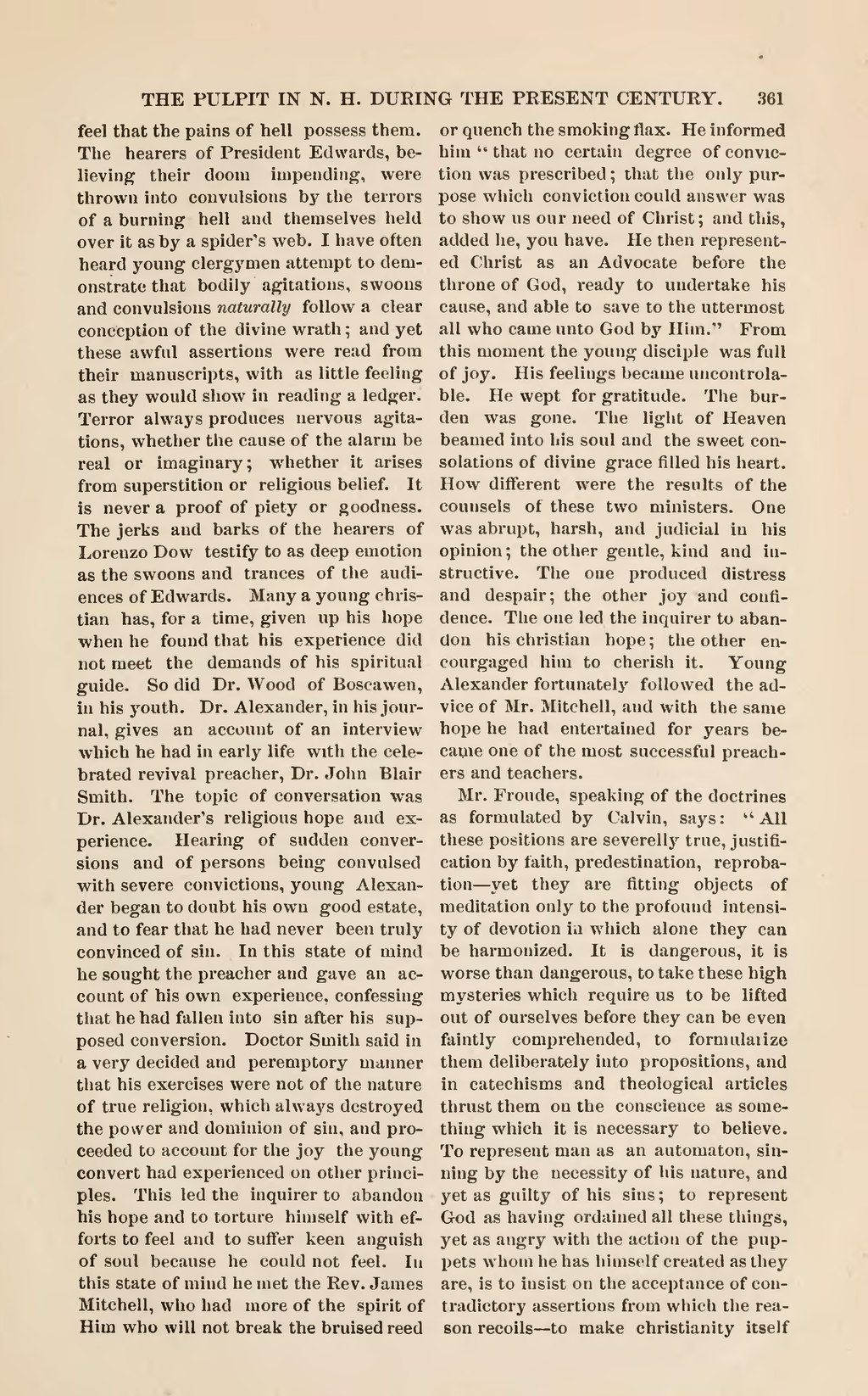THE PULPIT IN N. H. DUPING THE PRESENT CENTURY.
��361
��feel that the pains of hell possess them. The hearers of President Edwards, be- lieving their doom impending, were thrown into convulsions by the terrors of a burning hell and themselves held over it as by a spider's web. I have often heard young clergymen attempt to dem- onstrate that bodily agitations, swoons and convulsions naturally follow a clear conception of the divine wrath ; and yet these awful assertions were read from their manuscripts, with as little feeling as they would show in reading a ledger. Terror always produces nervous agita- tions, whether the cause of the alarm be real or imaginary ; whether it arises from superstition or religious belief. It is never a proof of piety or goodness. The jerks and barks of the hearers of Lorenzo Dow testify to as deep emotion as the swoons and trances of the audi- ences of Edwards. Many a young chris- tian has, for a time, given up his hope when he found that his experience did not meet the demands of his spiritual guide. So did Dr. Wood of Boscawen, in his youth. Dr. Alexander, in his jour- nal, gives an account of an interview which he had in early life with the cele- brated revival preacher, Dr. John Blair Smith. The topic of conversation was Dr. Alexander's religious hope and ex- perience. Hearing of sudden conver- sions and of persons being convulsed with severe convictions, young Alexan- der began to doubt his own good estate, and to fear that he had never been truly convinced of sin. In this state of mind he sought the preacher and gave an ac- count of his own experience, confessing that he had fallen into sin after his sup- posed conversion. Doctor Smith said in a very decided and peremptory manner that his exercises were not of the nature of true religion, which always destroyed the power and dominion of sin, and pro- ceeded to account for the joy the young convert had experienced on other princi- ples. This led the inquirer to abandon his hope and to torture himself with ef- forts to feel and to suffer keen anguish of soul because he could not feel. In this state of mind he met the Rev. James Mitchell, who had more of the spirit of Him who will not break the bruised reed
��or quench the smoking flax. He informed him " that no certain degree of convic- tion was prescribed ; that the only pur- pose which conviction could answer was to show us our need of Christ; and this, added he, you have. He then represent- ed Christ as an Advocate before the throne of God, ready to undertake his cause, and able to save to the uttermost all who came unto God by Him." From this moment the young disciple was full of joy. His feelings became uncontrola-
��He wept for gratitude. The bur- was gone. The light of Heaven
��ble. den
beamed into his soul and the sweet con- solations of divine grace filled his heart. How different were the results of the counsels of these tw r o ministers. One was abrupt, harsh, and judicial in his opinion ; the other gentle, kind and in- structive. The one produced distress and despair; the other joy and confi- dence. The one led the inquirer to aban- don his christian hope ; the other en- courgaged him to cherish it. Young Alexander fortunately followed the ad- vice of Mr. Mitchell, and with the same hope he had entertained for years be- came one of the most successful preach- ers and teachers.
Mr. Fronde, speaking of the doctrines as formulated by Calvin, says: "All these positions are severelly true, justifi- cation by faith, predestination, reproba- tion — yet they are fitting objects of meditation only to the profound intensi- ty of devotion in which alone they can be harmonized. It is dangerous, it is worse than dangerous, to take these high mysteries which require us to be lifted out of ourselves before they can be even faintly comprehended, to formulaiize them deliberately into propositions, and in catechisms and theological articles thrust them on the conscience as some- thing which it is necessary to believe. To represent man as an automaton, sin- ning by the necessity of his nature, and yet as guilty of his sins ; to represent God as having ordained all these things, yet as angry with the action of the pup- pets whom he has himself created as they are, is to insist on the acceptance of con- tradictory assertions from which the rea- son recoils — to make Christianity itself
�� �
